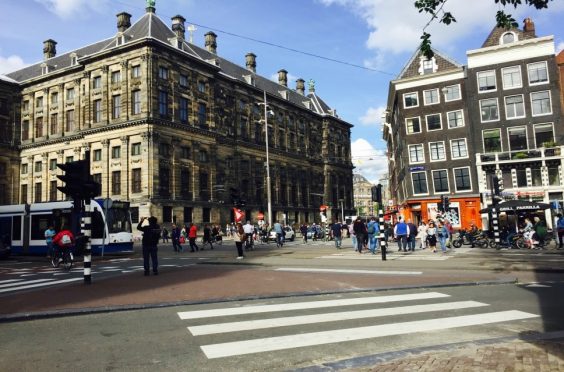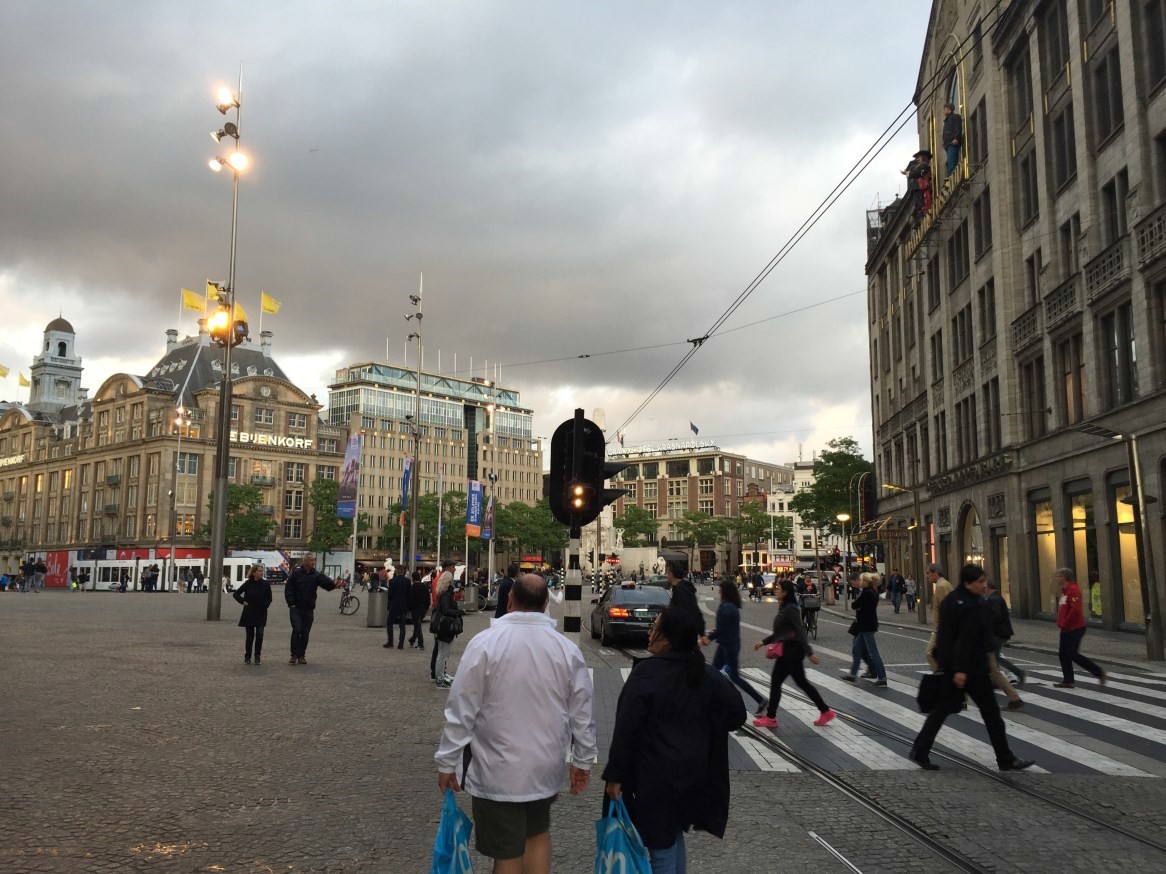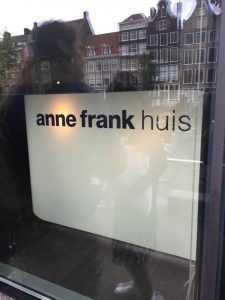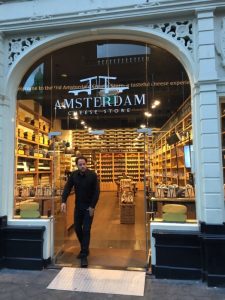Pre-departure:
The first essential for planning my trip to Amsterdam was to apply for a Schengen visa.
The application process was surprisingly un-tedious. The application was rather straightforward and it was processed under 72 hours. The other boxes that needed to be ticked included: Health insurance, travel insurance, and obviously the most important, flight bookings. So, logistics and technicalities aside, my pre-departure plans were exciting.
SU International offered a great pre-departure orientation. This provided us with information about how to prepare yourself and you get to meet all the other students who are going on summer schools. This is where I met another fellow student who was doing a summer school in Amsterdam.
Firstly, we all know June/July is the best time to travel Europe. Given that it was summer, I mistakenly checked the weather forecast the day before I left. Only to realise that my travel plans required an umbrella and possibly raincoat, with which I had neither.
Secondly, I took the time to research food markets, restaurants and art exhibitions and museums that are a must for someone who is spending a limited amount of time in a city. Knowing that I would need my laptop for summer school purposes, I made a list of all the places I would make an effort to visit and tagged everything online. The third, most quintessential step was to decide on what to take with me. I opted for minimal light clothing, obviously excluding the umbrella and raincoat.
The summer school course I applied for was over two weeks. There is always the option of deciding to travel before or after. This is a point that cannot be emphasised more. This type of travel does not necessarily need to be continental, but also just in the country you’re visiting. I made the effort to find other interesting, cultural cities in the Netherlands that would be worth my while. Instead of organising this while I was there, I did it before for budgetary purposes mostly.
An understated significant ‘thing’ to keep in mind was that most Dutch citizens (who preside in the city of Amsterdam) are fluent in English (from thorough research), so purchasing a Dutch handbook was not a priority. Downloading a map on your phone is an absolute MUST! This is more important if one plans on using the public transport system, or even better, hiring bicycles! Doing a basic, quick search of the accommodation in relation to the university is highly recommended. After this, the accommodation location distance to the city centre is also important. This gives you an idea into what needs to be pre-booked regarding transport options. Researching travel costs and options is essential. The excitement mounted to unprecedented levels, a few hours preceding my departure. Expectations, expectations, expectations! Especially about the people, summer school course, food, galleries and museums.
On the note of expectation, the university organised social programmes. The ones I decided on was the Citywalk and a visit to the Anne Frank Museum. For me the Anne Frank Museum would be the most ultimate treat of the trip.
Experience at the Vrije University Amsterdam:
I was accepted for the Big Data in Society summer school course at Vrije University Amsterdam. Solely based on my pre-existing knowledge of Big Data, I expected a module that was based on the analysis of large amounts of information and data. The one aspect I did not expect was the extent to which coding would be applied. But, nonetheless it is a great foundational step for research methodology and quantitative analysis.
The first day in Amsterdam was allocated for social purposes. The summer school interns were extremely helpful and friendly. I stayed at the university accommodation with 30 other exchange students. The accommodation was clean and in the perfect location, regarding university distance proximity.
My class consisted of 20 students in total from different universities around Europe, Asia and Australia. The class was academically diverse, with students coming from the Bachelor of Arts backgrounds to Computer Sciences. The first day was particularly difficult, as the lecturers threw everyone into the deep end. The first day laid the foundation for coding and programming. We were introduced to the R programme, which would end up being the application we would be marked on. Throughout the programme we learnt about the theory of linked data and Crowdtruth metrics. My favourite module in the course was Crisis Management, where we learned how companies and organisations utilise large amounts of data for the purposes of controlling and mitigating crises. The final project that we had to do presentations for was based on group work. This made everything a lot easier. We had to select a topic and research data on that topic on a social media platform. Our final project was about understanding the discourse on gun control between Democrats and Conservative Republics on Facebook and Twitter. Quantitative text analysis was conducted on the topic, with the aim of identifying the dynamics of the subject and providing insight into the topic.
This is definitely a skill set that I will use for my academics. The lecturers were absolutely fantastic. They were easily accessible and patient. They were always prepared to spend extra time helping with our projects.
Visiting the Anne Frank house was one of the highlights of my trip. It was a truly unbelievable experience, especially since the university organised pre-booked tickets, meaning we did not have to stand in the long-winding lines. The university hosted several parts that encouraged students from different courses to meet and interact on a more social and personal level. There was a really cool festive bar on campus, called ‘the Basket’. Class started at 9am and we were normally done around 4pm, so there was nothing better than taking down a fresh beer at the end of the day.
The experience at VU Amsterdam was not particularly different from the teaching and learning at Stellenbosch. Classes were interactive and diverse. The biggest difference was the closeness of all the different university cafes and Wi-Fi speed. Besides the small differences, my university experience was not different to my Stellenbosch university experience.
Return to Stellenbosch:
Returning to Stellenbosch and getting back into the grove of things has been relatively easy. I definitely learned more about a subject field that is completely different to what I study. I was able to learn different ways of conducting research, which indirectly also teaches you about different perspectives surrounding how to approach research questions. Secondly, I realised the high quality of education Stellenbosch offers. In terms of teaching styles and university facilities and resources – I can honestly say there is not difference. Both institutions embody a high calibre of education.
The thing I miss the most about Amsterdam is the easiness of society and how everything is done there – on a structural level especially. I do miss the cheese markets the most. Coming back has also made me realise how incredibly multicultural Amsterdam is. The most magnificent characteristic is being in a city that has the most iconic canals and museums. One of the biggest differences between the culture in Stellenbosch and Amsterdam is the ‘multicultural-ness’ of the city. There are so many diverse neighbourhoods which make the city even more exquisite. I understand why people always say Amsterdam is a thriving city.
There is ALWAYS something to do – from contemporary art exhibitions to canal rides to eating at trendy restaurants.
There is a high level of acceptance that one does not necessarily feel in Stellenbosch – mostly regarding identity. People generally have this way of being friendly but living in their own world. It appears to be quite an individualistic society. That was one of the winning factors for me. It’s an incredibly livable city – efficient public transport, cycling culture and amazing food markets, and most places were in close proximity. There is a heavy emphasis on arts and the preservation of Dutch culture which is important.
This was my first time travelling to the Netherlands and I would definitely go again. This experience provided me with a greater insight into different academic institutions and ways of living. There is the idea of simplicity of society that resonates. It’s the definition of what one would call an organic city. It provides a completely fresh perspective on how people live. Dutch people are extremely friendly. But there is nothing better than being home.




